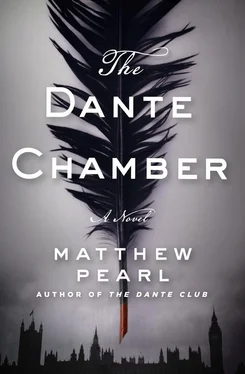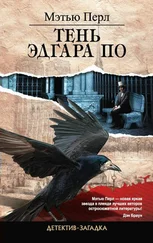He wanted to write a new crime pamphlet, and, with the extra time on his hands after his latest schism with the rotten, double-dealing, beastly Pinkerton, he had found his perfect opportunity. When he read in the foreign news columns of the Boston Herald about the dead politician discovered in a London public garden, he recognized similarities — possibly a direct connection — to the gruesome Dante murders in Boston he’d gained a pretty penny writing about (losing those pennies subsequently, which was an entirely different story). That’s when he booked his passage across the Atlantic. Now, upon arrival, practically as soon as he stepped down to the harbor, there was a ready-made scene for his pamphlet-in-progress!
Camp studied the police constables flitting back and forth along the piers, some of whom were the same ones Holmes glimpsed earlier that day. Bloodhounds yapped and howled as they ran up and down lines of passengers waiting to board. This wasn’t just the usual customs operation looking for pirated books to confiscate and restricted goods upon which to heap extra fees.
Liverpool, the dirty and ugly gateway to England, in the lazy late winter of 1870, amid the decidedly English stench of mutton pie and horse dung, witnessed a horde of police “bobbies” and their dog detectives scouring the seaport, all looking, hunting, searching: but for whom? A ghastly and heartless murderer still nameless to all but the fiend himself!
He scribbled these words into a pocket-size notebook and punctuated his creative burst with a chortle of joy. When he later reached the train depot, he would find an even more promising development, for his purposes, than the sight of the constables. The papers hawked by the newsboys would inform him that a woman died in yet another method taken from Dante. Dante had a natural imagination for inventing torments. In fact, the surly Italian poet never seemed to run out of them.
This mission would be even easier than Camp thought.
And Camp’s own narrative would be able to feature a different champion this time. Not gawky students as in the story of the so-called technology disasters of ’68 (a pamphlet he’d entitled Science Run Amok ), not stately poets as appeared in his original Dante Murders booklet, but him , Simon Thomas Camp (S. T. Camp, he thought of styling himself). This time, he would resolve the mystery by himself, unveil the identity of the murderer, and chronicle it every step of the way. He would be the alpha and omega. He would be the teller and the hero of the tale. Like that Dante fellow , he thought to himself, proud of how he’d educated himself since the first time he heard that name from the lips of a Harvard swell: Dante, a name that had already changed the course of his life, and was about to again.
Dante, abbreviated from the Italian’s given name, Durante, or at least that’s what Camp remembered reading in some dull-as-lead book.
Dante, a name about to carry him back to wealth and glory.
The opera proved a rousing success. Spontaneous cheers interrupted the performance several times, nearly one-third of the audience stood for an ovation at intermission, encores drew the lead female soloist back to the stage at the conclusion, and only twenty-four audience members were counted sleeping.
Perhaps just as satisfying was the number of distinguished members of the audience, including politicians, businessmen, philanthropists, and literary lights such as the poet Robert Browning.
Browning’s natural element — society. His brilliant white tie and waistcoat, his spotless dark frock coat. Mr. Browning, the greatest diner-out and second greatest ... Browning tried to drown out the words still ringing in his ears from his visit to the Hughes art studio. When he had reached the box in the upper tier he’d reserved for the performance, champagne and a plate of galantine awaited him. Browning took a bow at the round of applause given by the audience members who noticed him enter — as though he were one of the tenors for the evening’s show. His shoulders were practically as broad as theirs, at any rate.
The opera told the story of a woman rescuing her husband from imprisonment. Not that Browning concentrated much on the drama of the opera, not with so much on his mind, ranging from the plans made that very morning to events that took place five hundred and fifty years before (approximately speaking).
The thoughts that dwelled in those centuries long past belonged to the world of Dante Alighieri. It occurred to Browning that he was now about the age Dante was when he died. Unlike the sociable Browning, the great Florentine had been a severe man, by most accounts, though the earlier poet supposedly was courteous enough unless provoked. As Dante walked the lonely lanes of out-of-the-way Tuscan villages, the peak of his red cap drooping to one side of his head, he faced one of the many crossroads in his life.
His wife and children pined for him since his exile. The hidden victim of his adoration for the memory of Beatrice was Gemma, Dante’s wife, whose thankless lot it was to be compared with angelic perfection. Now the poet had to choose between devoting himself to his poem — one that would probably take the rest of his life to complete — and initiating all-consuming plans to transport his family to be by his side. It was a decision all poets and artists make at one time or another, whether to stymie their art on behalf of the people they loved.
There was the anecdote from around that same time recounting when Dante, as he strolled along in contemplation, heard one of his sonnets being sung — but with phrases added that didn’t belong. Dante followed the song until he came upon a blacksmith striking his anvil. He entered the workshop, took the blacksmith’s hammer, and threw it across the street, and did the same to more of the man’s tools.
The livid blacksmith, nearly pulling out his own hair, accosted Dante. “Are you mad? What the devil are you about?”
“What are you about?”
“My trade, and you spoil my tools by throwing them into the street!”
“If you do not wish me to spoil your things, do not spoil mine,” Dante replied. “You sing songs from my pen, but not as I wrote them. I have no other trade and you spoil it for me.”
The blacksmith from then on would sing of Tristram, Lancelot, Grendel, anything but Dante.
There were some writers who wanted all the world to read them. Then there were writers like Dante, who wanted as few readers as understood him.
It was that kind of commitment that must have brought Dante to his final decision. He would leave behind his family, never to see them again. Perhaps not only because of the complexities of his creative needs and the hardships of his political exile but also because his masterwork hinged on love for a woman who was not his wife. His love for a dead woman — Beatrice — had become holier to him than his relationship with his family.
Browning was increasingly convinced Dante spent much of his life searching for reasons why Beatrice had to die. Browning felt confident in this because he had done the same when it came to his Ba, though both women — Beatrice in 1290, Elizabeth in 1861 — died of natural illness. He always thought about what might have been different had Ba been chosen as the laureate instead of Alfred Tennyson. Would the Brownings have returned from Italy to England? Could her health have improved, could she have grown stronger, could she have survived ?
Ba used to reminisce to her husband about her childhood, when as a girl she went to sleep each night with a nurse by her side because her father insisted she was too frail to be alone. I shall not like to be grown up , she remembered thinking to herself, because then I shall have nobody to take care of me — nobody to trust to take care of me .
Читать дальше












